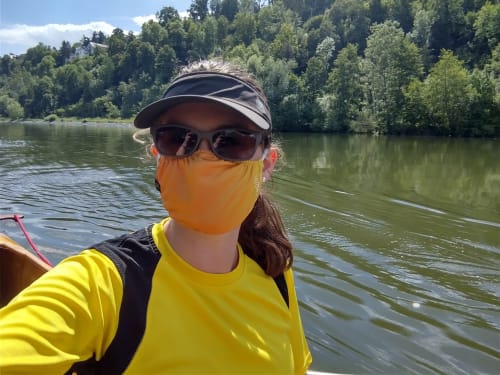
Most of the languages I know have different personal pronouns to distinguish a formal and an informal form of address – English is the exception here. There are indeed ways to address someone formally, but there is no special pronoun used for this purpose in English. On top of that, the second person plural also uses the same pronoun. It's always "you".
That's something that bothers me a lot in language learning, especially when I'm learning a new language through English. When Duolingo, for example, wants me to translate a sentence like "You have an apple." into Polish, I only think about "Masz jabłko." (2nd pers. sing.) and not "Macie jabłko." (2nd pers. plural). When reading "you" without any context, I normally assume that it addresses the second person singular in an informal way.
In another Journaly post, I read a question related to this topic. They asked how "tratarse de usted" could be translated into English. More specifically, they asked about a scene in The Shadow of the Wind (chapter 2) in which Daniel addressed Clara formally (usted) and she tells him that she'd prefer if he'd address her informally (tú) instead.
In fact, the whole scene is quite odd because, despite Clara's wish to be called 'tú' by Daniel, he continues to call her 'usted' instead.
Here are some excerpts of this scene in different languages.
Spanish:
—¿Qué edad tienes? —preguntó.
—Casi once años —respondí—. ¿Y usted?
Clara rió ante mi insolente inocencia.
—Casi el doble, pero tampoco es como para que me trates de usted.
—Parece usted más joven —apunté, intuyendo que aquello podía ser una buena salida a mi indiscreción.
—Me fiaré de ti entonces, porque yo no sé qué aspecto tengo —repuso, sin abandonar su sonrisa a media vela—. Pero si te parezco más joven, razón de más para que me trates de tú.
—Lo que usted diga, señorita Clara.
European Portuguese:
– Que idade tens? – perguntou.
– Quase onze anos – respondi. – E a menina?
Clara riu ante a minha insolente inocência.
– Quase o dobro, mas também não é preciso tratares-me por você.
– Parece mais nova – frisei, pressentindo que podia ser uma saída airosa para a minha indiscrição.
– Então vou confiar em ti, porque não sei como sou – retorquiu, sem abandonar o seu meio sorriso. – Mas, se te pareço mais nova, mais uma razão para me tratares por tu.
– Como deseje, menina Clara.
English:
‘How old are you?’ she asked.
‘Almost eleven,’ I replied. ‘How old are you, Miss Clara?’
Clara laughed at my cheeky innocence.
‘Almost twice your age, but even so, there’s no need to call me Miss Clara.’
‘You seem younger, miss,’ I remarked, hoping that this would prove a good way out of my indiscretion.
‘I’ll trust you, then, because I don’t know what I look like,’ she answered. ‘But if I seem younger to you, all the more reason to drop the “miss”.’
‘Whatever you say, Miss Clara.’
German:
»Wie alt bist du?« fragte sie.
»Fast elf. Und Sie?«
Clara lachte über meine unverschämte Naivität.
»Fast doppelt so alt, aber das ist auch wieder nicht so alt, daß* du mich zu siezen brauchst.«
»Sie sehen jünger aus«, bemerkte ich in der Ahnung, das könnte ein guter Ausweg aus meiner Indiskretion sein.
»Dann traue ich dir – ich weiß ja nicht, wie ich aussehe«, antwortete sie und lächelte weiter ihr halbes Lächeln. »Aber wenn ich dir jünger vorkomme, ist das ein Grund mehr, daß* du mich duzt.«
»Wie Sie meinen, Señorita Clara.«
*The German ebook seems to use the old orthography.
This table directly compares how formality and informality are expressed in these four languages.
formal/ informal | Spanish | Portuguese | English | German |
informal | ¿Qué edad tienes? | Que idade tens? | How old are you? | Wie alt bist du? |
formal | ¿Y usted? | E a menina? | How old are you, Miss Clara? | Und Sie? |
informal, talking about formality | pero tampoco es como para que me trates de usted. | mas também não é preciso tratares-me por você. | but even so, there’s no need to call me Miss Clara. | aber das ist auch wieder nicht so alt, dass du mich zu siezen brauchst. |
informal, talking about informality | Pero si te parezco más joven, razón de más para que me trates de tú. | Mas, se te pareço mais nova, mais uma razão para me tratares por tu. | But if I seem younger to you, all the more reason to drop the “miss”. | Aber wenn ich dir jünger vorkomme, ist das ein Grund mehr, dass du mich duzt. |
formal | Lo que usted diga, señorita Clara. | Como deseje, menina Clara. | Whatever you say, Miss Clara. | Wie Sie meinen, Señorita Clara. |
Comparing these four languages, I feel like you can treat someone better in a formal way if there are special pronouns available to do so. I also noticed that the English translator often used a lot more words to express the same thing in English because of the lack of those pronouns.
Are there other languages in which there are no pronouns to distinguish the addressing of the second person formally or informally? Which are those languages? And, if you're reading La Sombra del Viento in this language, how did the translator render this scene into said language?
\\Sources
- Spanish excerpt: Zafón, Carlos Ruiz (2016-12-11T22:58:59). Tetralogía El Cementerio de los Libros Olvidados (pack) (Spanish Edition) . Grupo Planeta. Kindle-Version.
- Portuguese excerpt: Ruiz Zafón, Carlos. A Sombra do Vento (p. 19). Grupo Planeta. Kindle-Version.
- English excerpt: (2009-04-15T23:58:59). The Shadow Of The Wind (The Cemetery of Forgotten Series Book 1). Orion. Kindle-Version.
- German excerpt: Zafón, Carlos Ruiz (2013-03-06T22:58:59). Der Schatten des Windes: Roman (Fischer Taschenbibliothek) (German Edition). FISCHER E-Books. Kindle-Version.
- Image from Marielou Lolilop on Pixabay

Linda, that's a very nice point. I was curious how that was translated in English as it lacks this specificity, and I think that the translator captured it well with "miss". In Italian and Romanian, the languages I am reading the book, we have the formal/informal you: [IT]: E lei? ... non è il caso che tu mi dia del lei ... devi darmi del tu ... Come preferisce, signorina Clara. [RO]: Dar dumneavoastră? ... însă nu-i totuşi cazul să-mi spui "dumneavoastră"... cu atât mai mult trebuie să mă tutuieşti... Cum spuneţi dumneavoastră, domnişoară Clara.
Hi Erich, thanks for adding your languages! The Romanian word of "formal you" seems to be very long! By the way, would you mind looking for translations from your books to my other post? https://journaly.com/post/5949
Interesting. I am not reading it. But I did some web searching. I know Finnish has formal you, and I checked for Arabic, Mandarin and Hindi. It seems that English "you" may have been more formal, and replaced thee (sing) and ye (pl) in the Middle English period. Not sure if some reports that the old formal you is no longer used in Swedish or Norwegian are correct.
Hey Linda, yes, in writing, they usually abbreviate "dumneavoastră" to "dvs". This word actually contains two words: domnia+voastră, which one could translate to "your honor". Funnily enough, they also have something between the informal "tu" and the formal "dumneavoastră": the "dumneata" which is used (among others) when swearing at somebody you should normally be polite to ;-) -- I will check your other post tomorrow, as it's already quite late...
I look forward to reading your article tomorrow, Linda, when I have, as my mother would say, "a fresh head"! Cheers, Sarah
I would have said “you may call me ‘Clara’, no need for ’miss’.” But it does lack in English
In both French and Bulgarian, there are similarly different formal and informal versions of "you" ("vous" and "tu", and "вие" and "ти", respectively).
tus posts son muy profesionales. Yo debería empezar a leer el libro también en alemán para ir mejorando :)
Thank you all for commenting! I really enjoy discussions like these on Journaly :-)